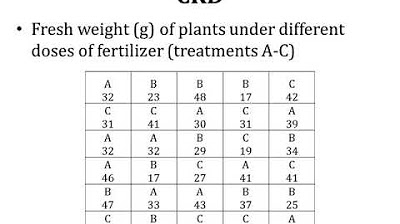Introduction to Experimental Designs; Principles; Randomization; Replication; Local Control
TLDRThis script delves into the fundamentals of experimental design, emphasizing the importance of planning to obtain relevant data and drawing inferences. It distinguishes between experiments and observational studies, highlighting the necessity of testable hypotheses, independent and dependent variables, and experimental units. The video outlines key principles such as randomization, replication, and local control to ensure accurate and valid results. Examples, particularly in agriculture, illustrate these concepts, emphasizing the impact of design on the experiment's validity and the significance of understanding research questions and conditions.
Takeaways
- 📚 The definition of design and analysis of experiments involves planning an experiment to obtain appropriate data and drawing inferences from that data with respect to a problem under investigation.
- 🔍 The main components of experimental design include a problem under investigation, planning an experiment to obtain data, and using that data to draw inferences about the problem.
- 🌱 Experimental design is a method to create procedures for testing a hypothesis, often formulated as an explanation for a problem being investigated.
- 🧐 The difference between experiments and observational studies is that in experiments, treatments are deliberately applied to subjects to observe responses, while in observational studies, data is collected without altering conditions.
- 📊 A testable hypothesis is one that can be tested through an experiment, such as investigating the effects of fertilizer dose on crop yield.
- 🔧 Independent variables are those that can be precisely manipulated in an experiment, like varying the amount of fertilizer applied to plants.
- 📏 The dependent variable is usually one that can be precisely measured and is the response variable, such as the crop yield in response to different fertilizer doses.
- 🌿 An experimental unit is a single object or subject that receives a specific treatment, like a single crop plant receiving a particular fertilizer dose.
- 🔑 A block is a collection of experimental units that receive a similar treatment, which can help control for extraneous variation.
- 🔄 The principles of experimentation include randomization, replication, and local control, which are essential for increasing the accuracy and validity of an experiment.
- 🌟 Understanding the research question and experimental conditions is crucial for deciding the levels of treatment variables and the relationship between treatments and response variables.
Q & A
What is the definition of design and analysis of experiments?
-Design and analysis of experiments is the process of planning an experiment to obtain appropriate data and drawing inferences from that data with respect to any problem under investigation.
What are the main components of design and analysis of experiments?
-The main components include a problem under investigation, planning an experiment to obtain appropriate data, and using that data to draw inferences or conclusions about the problem.
What is an experimental hypothesis?
-An experimental hypothesis is a proposed explanation for a problem under investigation that can be tested through an experiment.
How does experimental design differ from observational studies?
-In experimental design, treatments are deliberately applied to a group of subjects to observe a response, whereas in observational studies, data is collected and analyzed without altering existing conditions.
What is an independent variable in an experiment?
-An independent variable is a variable that can be precisely manipulated by the experimenter to test its effect on the dependent variable.
What is a dependent variable in an experiment?
-A dependent variable is the variable that is measured in an experiment to observe the effects of changes in the independent variable.
What is an experimental unit in an experiment?
-An experimental unit is a single object or subject that receives a specific treatment in an experiment.
What is a block in experimental design?
-A block is a collection or group of experimental units that receive a similar treatment or dose of the independent variable.
What are the three basic principles of experimentation?
-The three basic principles of experimentation are randomization, replication, and local control.
Why is randomization important in experimental design?
-Randomization is important to ensure that every experimental unit has an equal chance of receiving any treatment, reducing bias and increasing the accuracy of the experiment.
What is replication in experimental design and why is it important?
-Replication is the repetition of an experiment under identical conditions. It is important because it increases the precision of the experiment by accounting for variability and reducing the impact of extraneous factors.
What is local control in experimental design and how does it help?
-Local control is the management of all factors except those being investigated to reduce variations due to extraneous factors, thus minimizing experimental error and increasing the precision of the experiment.
Outlines
🔬 Introduction to Experimental Design
The script introduces the concept of experimental design, defining it as the planning and analysis of experiments to obtain relevant data and draw inferences about a problem under investigation. It emphasizes the importance of planning an experiment to answer a scientific query, obtaining appropriate data, and using that data to test hypotheses. The script outlines the components of experimental design, including the problem under investigation, the planning of the experiment, and the statistical analysis to draw conclusions. An example of investigating the effects of different fertilizer doses on crop yield is given to illustrate the process.
🌱 Experimental vs. Observational Studies
This paragraph delves into the differences between experimental and observational studies. In experiments, treatments are deliberately applied to subjects to observe their responses, whereas in observational studies, data is collected without altering existing conditions. The script uses the example of studying the effect of fertilizer dose on crop yield in an experimental setup versus examining crop yields from different soil types in an observational context. The importance of defining treatments, applying them, and analyzing the responses in experimental design is highlighted.
📊 Fundamental Concepts of Experimental Design
The script introduces key concepts in experimental design, such as testable hypotheses, independent and dependent variables, and experimental units. It explains that a testable hypothesis is one that can be proven or disproven through an experiment, like the hypothesis that crop yield is affected by fertilizer dose. Independent variables are those that can be manipulated, such as the amount of fertilizer, while the dependent variable, typically one, is the response variable, like crop yield. The concept of an experimental unit, which is a single subject receiving a treatment, is also discussed.
🧬 Sources of Variation in Experiments
This paragraph discusses the sources of variation in experiments, which include treatment and extraneous factors causing experimental error. Treatments are deliberate variations introduced by the experimenter, such as different fertilizer doses, while extraneous factors are largely uncontrolled, like genetic variation among plants or environmental conditions. The script explains that understanding and controlling these sources of variation are crucial for the accuracy and validity of experimental results.
🔄 Principles of Experimentation
The script outlines the three fundamental principles of experimentation: randomization, replication, and local control. Randomization ensures that every experimental unit has an equal chance of receiving any treatment, replication involves repeating the experiment under identical conditions to increase precision, and local control aims to control all factors except those being investigated. These principles work together to enhance the accuracy of the experiment and provide a valid test of significance.
🌿 Application of Principles in Experimental Design
This paragraph further explains the application of the principles of experimental design. It emphasizes the importance of randomization in eliminating bias, replication in enhancing precision by repeating treatments across multiple units, and local control in minimizing the effects of extraneous factors. The script also discusses the inclusion of a control or placebo group to reduce experimental error and the need for a clear understanding of research questions and experimental conditions for effective experimental design.
📐 Types of Experimental Designs
The script concludes by mentioning the three basic types of experimental designs used in field research, particularly in biology and agricultural sciences. These include the completely randomized design (CRD), where treatments are randomly assigned to experimental units, the randomized complete block design (RCBD), which involves randomization within blocks of units, and the Latin square design, which will be discussed in a separate lecture. Understanding these designs is crucial for conducting effective experiments.
Mindmap
Keywords
💡Experimental Design
💡Design and Analysis of Experiments
💡Hypothesis
💡Independent Variable
💡Dependent Variable
💡Testable Hypothesis
💡Experimental Unit
💡Block
💡Randomization
💡Replication
💡Local Control
💡Experimental Error
💡Observational Study
💡Principles of Experimentation
Highlights
Introduction to experimental designs, emphasizing the importance of planning and inference in obtaining appropriate data.
Definition of design and analysis of experiments as a process to plan an experiment and draw conclusions from the data.
Breakdown of the components involved in experimental design, including the problem under investigation and planning an experiment.
The purpose of an experiment is to obtain appropriate data for inference and conclusion drawing.
Experimental design as a method to create procedures for testing a hypothesis.
The concept of an experimental hypothesis as an explanation for the problem under investigation.
Explanation of how data from an experiment is used in statistical analysis to infer the validity of a hypothesis.
Use of an example to illustrate the concept of experimental designs, such as the effects of different fertilizer doses on crop yield.
Differentiation between experiments and observational studies, with a focus on the deliberate application of treatments in experiments.
Importance of defining treatments and applying them to subjects in an experiment to observe responses.
Concept of a testable hypothesis that can be verified through an experiment, like the effect of fertilizer on crop yield.
Discussion on independent variables, which are precisely manipulated in an experiment, such as fertilizer doses.
Identification of the dependent variable, which is the response variable measured in an experiment, like crop yield.
Introduction of the concept of an experimental unit, which is a single subject receiving a treatment in an experiment.
Explanation of a block as a collection of experimental units receiving the same treatment, also known as samples or groups.
Understanding of sources of variation in experiments, including treatment and extraneous factors causing experimental error.
Principles of experimentation, including randomization, replication, and local control to increase accuracy and validity.
Importance of randomization in giving every experimental unit an equal chance of receiving any treatment.
Necessity of replication in experiments to increase precision by repeating treatments on multiple units.
Role of local control in minimizing the effects of extraneous factors and reducing experimental error.
Inclusion of a control or placebo group in experiments to further reduce chances of experimental error.
The significance of understanding research questions and experimental conditions in deciding treatment levels and relationships.
Introduction to the three basic types of experimental designs used in field research: Completely Randomized Design (CRD), Randomized Complete Block Design (RCBD), and Latin Square Design.
Transcripts
Browse More Related Video

Top 10 Tips for AP Statistics Unit 3 Collecting Data

Elementary Statistics - Chapter 1 Introduction to Statistics Part 2

Psychological Research: Crash Course Psychology #2

Types of Variables in Research and Their Uses (Practical Research 2)

7.3 Quasi-Experimental Research

Lecture 18 Experimental Designs; Completely Randomized Design CRD; One Way ANOVA
5.0 / 5 (0 votes)
Thanks for rating: